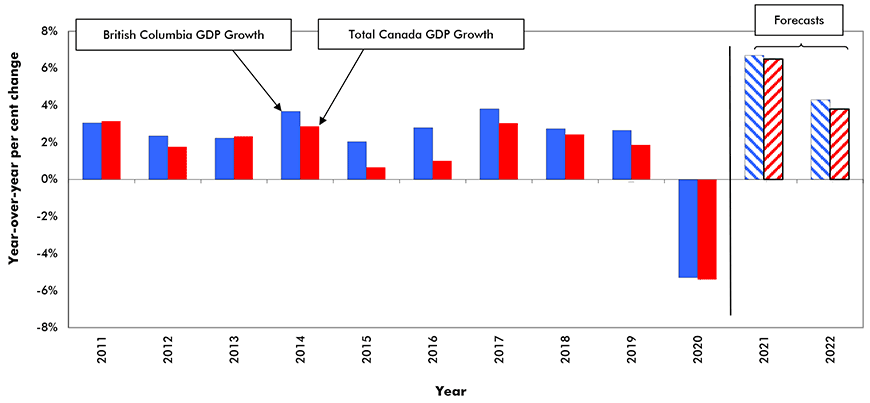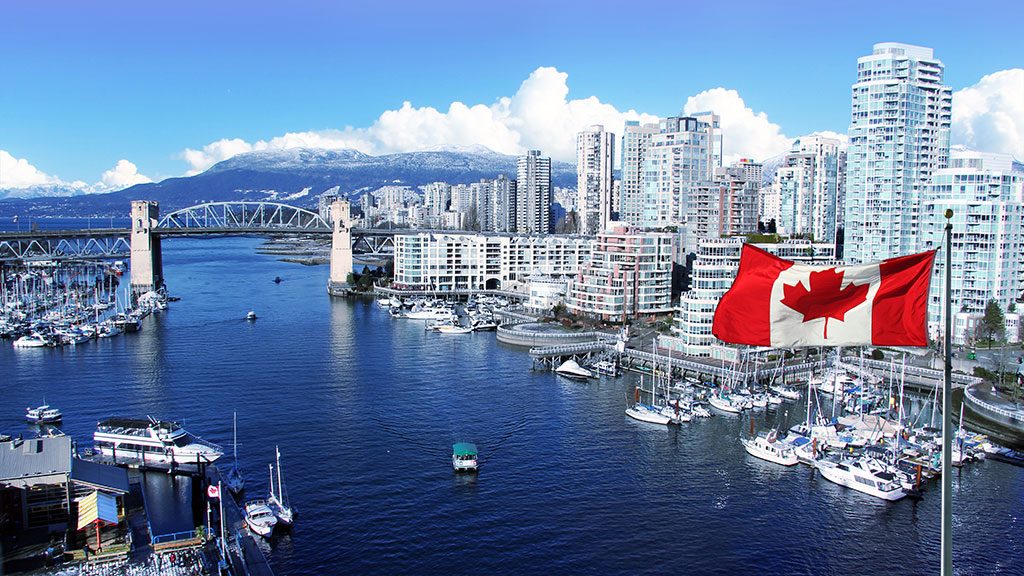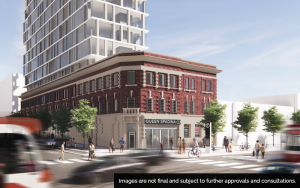Four key factors have caused the B.C. economy to outperform the country as a whole since the beginning of this year and will likely result in it continuing to do so into 2022. First, the B.C. economy was sideswiped by the second wave of COVID-19 and not hit head-on as was the case for most other provinces. B.C. employers, particularly those in service-related industries, did not have to lay off staff over the winter months. In March, total employment rose by +6.5% y/y, the best gain in the country.
Going forward, although the number of COVID-19 cases has escalated sharply since late February, at 2,274 cases per 100,000 individuals, the province has the sixth-lowest infection rate in the country. Also, B.C. has implemented strengthened province-wide restrictions that are scheduled to expire in late May.
Given the federal government’s glacial pace of vaccine distribution, the cloud of uncertainty due to COVID-19 will likely hang over the country and B.C. for some time. Nevertheless, a full lockdown of the province appears unlikely.
B.C. hiring is in high gear
Fuelled by an uninterrupted increase in total employment, record low-interest rates, and rising consumer confidence, consumer spending in B.C. has, over the past six months, increased by a country-leading +10.7% y/y. The outlook for consumer spending remains bright given the positive outlook for hiring, persisting low interest rates and a sustained rise in good consumer expectations.
Strong U.S. growth should continue to drive exports
A second major driver of the robust economic activity in B.C. has been exports which, over the past six months, have been up by +8% y/y, primarily due to a +85% increase in sales of forest products, the bulk (94%) of which are sold to customers in the U.S.
The American marketplace accounts for 64% of B.C.’s total foreign sales. Given recent upward revisions to U.S. growth forecasts, inspired by the recently passed $1.9 trillion U.S. stimulus package, the outlook for B.C.’s export sales appears very bright.
Expect post pandemic increase in net migration
A third contributor to the province’s economic health has been the sustained inflow of migrants both from within and, more recently, from outside the country. Although lockdowns across the country have been severely limiting interprovincial migration, B.C. has been alone in welcoming (net) migrants from other provinces.
In 2020, 23,000 individuals from within Canada moved to the province, a four-year high. In addition, as noted in Snapshot #7 titled, “Expect Canada’s Population to Recoup Lost Ground in 2022”, B.C. should attract more students and youth from Hong Kong following the Chinese government’s recent overhaul of Hong Kong’s electoral system.
B.C. has hottest housing market in country
The combination of strong jobs growth, a record inflow of migrants from other provinces, and near record-low interest rates have launched housing demand in British Columbia into a high orbit. Year to date, home sales are up by +96.9% y/y, just slightly less than twice the national increase of +53% y/y. As a result of this strong surge in sales, the months’ supply of homes for sale has fallen to an unprecedented low of 1.9, while average house prices have risen by +18.7% y/y.
The very strong uptick in demand has given a boost to supply. Year-to-date housing starts in the province are up by +53% due to gains in apartments (+62%), row units (+47%) and single-family units (+41%). Given this strong year-to-date pattern of new construction, we expect that, after hitting a four-year low in 2020, housing starts should range from 38,000 to 44,000 units this year and from 34,000 to 38,000 in 2022.
Energy projects are the major driver of non-res construction
The improved outlook for residential construction has been accompanied by an increase in non-res capital spending which should persist through the remainder of this year and into 2022. This prospect is reinforced by a recent Royal Bank Provincial Outlook for British Columbia and by Statistics Canada’s Non-Residential Capital Expenditures (2021) Intentions survey. The latter survey indicates that, following a COVID-19 depressed gain of +2.4% y/y in 2020, industries plan to increase their spending on non-res construction and machinery and equipment by +5.7% in 2021.
The largest contributor to the +5.7% total increase will be a +31% rise in spending by the oil and gas industry, due in part to increased spending on the Coastal GasLink pipeline, the LNG Canada in Kitimat project and the Trans Mountain Pipeline. As well, major spending is ongoing for the Broadway Subway project and the New St Paul’s Hospital. Also, in the just-released budget, the province’s Minister of Finance announced taxpayer-supported capital projects of $26.4 billion, up +$3.5 billion from the 2020 budget.
B.C. should outperform the rest of the country this year and maybe next
Given its positive prospects for consumer spending, exports, residential and non-residential construction, accompanied by its increasing vaccination rate against the background of a below-average COVID-19 infection rate, we expect the B.C. economy will outpace the rest of the country this year and quite possibly again in 2022. After contracting by an estimated -5.0% in 2020, B.C.’s growth will likely range from +5.7% to +6.5% in 2021 and from +4.0% to +4.5% in 2022.
John Clinkard has over 35 years’ experience as an economist in international, national and regional research and analysis with leading financial institutions and media outlets in Canada.
Real* Gross Domestic Product (GDP) Growth – British Columbia vs Canada

Chart: ConstructConnect — CanaData.
Please click on the following link to download the PDF version of this article:
Economic Snapshot Vol. 19, Issue 8 – B.C.’s economy is firing on all cylinders heading toward 2022 – PDF










Do you really mean “Kitimat LNG” or actually “LNG Canada” which is at Kitimat? Different projects, and Kitimat LNG has been ‘way less active than LNG Canada.